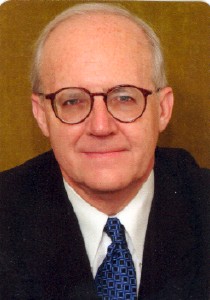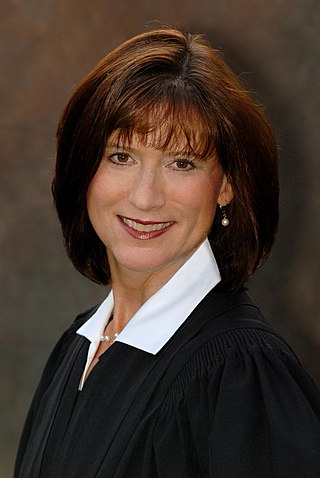Related Research Articles

Frank Hoover Easterbrook is an American lawyer and jurist who has served as a United States circuit judge of the U.S. Court of Appeals for the Seventh Circuit since 1985. He was the Seventh Circuit's chief judge from 2006 to 2013.
Elk Grove Unified School District v. Newdow, 542 U.S. 1 (2004), was a case decided by the U.S. Supreme Court. The lawsuit, originally filed as Newdow v. United States Congress, Elk Grove Unified School District, et al. in 2000, led to a 2002 ruling by the United States Court of Appeals for the Ninth Circuit that the words "under God" in the Pledge of Allegiance are an endorsement of religion and therefore violate the Establishment Clause of the First Amendment to the United States Constitution. The words had been added by a 1954 act of Congress that changed the phrase "one nation indivisible" into "one nation under God, indivisible". After an initial decision striking the congressionally added "under God", the superseding opinion on denial of rehearing en banc was more limited, holding that compelled recitation of the language by school teachers to students was invalid.
United States v. Dominguez Benitez, 542 U.S. 74 (2004), was a United States Supreme Court case in which the Court ruled that, in a criminal proceeding in federal court, a defendant who does not alert the district court to a possible violation of Rule 11 of the Federal Rules of Criminal Procedure must show on appeal that the violation affirmatively affected his rights in order to obtain reversal of his conviction by guilty plea. Rule 11, which pertains to criminal prosecutions in United States federal courts only, governs the offering of plea bargains to criminal defendants and the procedures district courts must employ to ensure that the defendant knows of and properly waives his trial-related constitutional rights.

James Harvie Wilkinson III is an American jurist who serves as a United States circuit judge on the United States Court of Appeals for the Fourth Circuit. His name has been raised at several junctures in the past as a possible nominee to the United States Supreme Court.

Danny Julian Boggs is an American lawyer and a senior United States circuit judge of the United States Court of Appeals for the Sixth Circuit. He was appointed to the court in 1986 and served as its chief judge from September 2003 to August 2009. Boggs was on the short list of President George W. Bush's candidates for the U.S. Supreme Court.

Diane Schwerm Sykes is an American jurist and lawyer who serves as the chief judge of the U.S. Court of Appeals for the Seventh Circuit. She served as a justice of the Wisconsin Supreme Court from 1999 to 2004.
Rapanos v. United States, 547 U.S. 715 (2006), was a United States Supreme Court case challenging federal jurisdiction to regulate isolated wetlands under the Clean Water Act. It was the first major environmental case heard by the newly appointed Chief Justice, John Roberts, and Associate Justice Samuel Alito. The Supreme Court heard the case on February 21, 2006, and issued a decision on June 19, 2006.

Bruce Marshall Selya is a senior United States circuit judge of the United States Court of Appeals for the First Circuit and former chief judge of the United States Foreign Intelligence Surveillance Court of Review who is known for his distinctive writing style.

Thomas Lee Ambro is a Senior United States circuit judge of the United States Court of Appeals for the Third Circuit.
Crawford v. Marion County Election Board, 553 U.S. 181 (2008), was a United States Supreme Court case in which the Court held that an Indiana law requiring voters to provide photographic identification did not violate the United States Constitution.

Raymond Michael Kethledge is a United States circuit judge of the United States Court of Appeals for the Sixth Circuit. He was appointed by President George W. Bush in 2008. Kethledge appeared on Donald Trump's list of potential Supreme Court of the United States nominees in 2016, and was described by press reports as a finalist in President Trump's nomination to replace Anthony Kennedy on the court.
Bilski v. Kappos, 561 U.S. 593 (2010), was a case decided by the Supreme Court of the United States holding that the machine-or-transformation test is not the sole test for determining the patent eligibility of a process, but rather "a useful and important clue, an investigative tool, for determining whether some claimed inventions are processes under § 101." In so doing, the Supreme Court affirmed the rejection of an application for a patent on a method of hedging losses in one segment of the energy industry by making investments in other segments of that industry, on the basis that the abstract investment strategy set forth in the application was not patentable subject matter.
United States v. Jones, 565 U.S. 400 (2012), was a landmark United States Supreme Court case in which the court held that installing a Global Positioning System (GPS) tracking device on a vehicle and using the device to monitor the vehicle's movements constitutes a search under the Fourth Amendment.
Fisher v. University of Texas, 570 U.S. 297 (2013), also known as Fisher I, is a United States Supreme Court case concerning the affirmative action admissions policy of the University of Texas at Austin. The Supreme Court voided the lower appellate court's ruling in favor of the university and remanded the case, holding that the lower court had not applied the standard of strict scrutiny, articulated in Grutter v. Bollinger (2003) and Regents of the University of California v. Bakke (1978), to its admissions program. The Court's ruling in Fisher took Grutter and Bakke as given and did not directly revisit the constitutionality of using race as a factor in college admissions.
Moseley v. V Secret Catalogue, Inc., 537 U.S. 418 (2003), is a decision by the Supreme Court of the United States holding that, under the Federal Trademark Dilution Act, a claim of trademark dilution requires proof of actual dilution, not merely a likelihood of dilution. This decision was later superseded by the Trademark Dilution Revision Act of 2006 (TDRA).
Republic of Argentina v. NML Capital, Ltd., 573 U.S. 134 (2014), is a U.S. Supreme Court opinion regarding foreign sovereign immunity. After defaulting on its debt and losing a federal collection action, Argentina claimed that its foreign assets were immune from discovery. The Court found that no such immunity existed.
Reed v. Town of Gilbert, 576 U.S. 155 (2015), is a case in which the United States Supreme Court clarified when municipalities may impose content-based restrictions on signage. The case also clarified the level of constitutional scrutiny that should be applied to content-based restrictions on speech. In 2005, Gilbert, Arizona adopted a municipal sign ordinance that regulated the manner in which signs could be displayed in public areas. The ordinance imposed stricter limitations on signs advertising religious services than signs that displayed "political" or "ideological" messages. When the town's Sign Code compliance manager cited a local church for violating the ordinance, the church filed a lawsuit in which they argued the town's sign regulations violated its First Amendment right to the freedom of speech.
McFadden v. United States, 576 U.S. 186 (2015), was a United States Supreme Court case in which the Court held that section 841 of the Controlled Substances Act requires the government to prove that to be in criminal violation, a defendant must be aware that an analogue defined by the Controlled Substance Analogue Enforcement Act with which he was dealing was a controlled substance.
Sessions v. Dimaya, 584 U.S. 148 (2018), was a United States Supreme Court case in which the Court held that 18 U.S.C. § 16(b), a statute defining certain "aggravated felonies" for immigration purposes, is unconstitutionally vague. The Immigration and Nationality Act (INA) classifies some categories of crimes as "aggravated felonies", and immigrants convicted of those crimes, including those legally present in the United States, are almost certain to be deported. Those categories include "crimes of violence", which are defined by the "elements clause" and the "residual clause". The Court struck down the "residual clause", which classified every felony that, "by its nature, involves a substantial risk" of "physical force against the person or property" as an aggravated felony.
Holmes Group, Inc. v. Vornado Air Circulation Systems, Inc., 535 U.S. 826 (2002), is a United States Supreme Court case regarding the jurisdiction of the United States Court of Appeals for the Federal Circuit.
References
- 1 2 Czarnezki, Jason (2006). "The Dubitante Opinion". Akron Law Review. 39 (1): 1–7. Retrieved Sep 17, 2022.
- ↑ Lon Fuller, Anatomy of the Law 147 (1968) (quoted in Credit Suisse First Boston Corp. v. Grunwald, 400 F.3d 1119 , 1151 (9th Cir. 2005)).
- ↑ 524 F.2d 384 , 393 (2d Cir. 1975).
- ↑ Czarnezki, 2-3: "the term has been used in only 626 written opinions....Of the 626 total cases using the term, 269 are federal cases, twelve of those coming from the United States Supreme Court".
- ↑ Czarnezki, 3.
- ↑ Czarnezki 3–4.
- 1 2 Czarnezki 3 n.12.